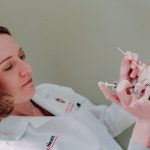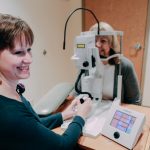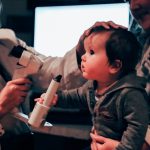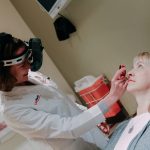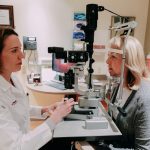Losing vision is devastating. For individuals with inherited retinal degenerations (IRD), vision loss is a daily reality affecting even the simplest of tasks. Furthermore, an accurate diagnosis as to what is creating vision change is usually very challenging, and many individuals become frustrated by lack of information, or wrong information, that they have received in the past. Born out of the recognition of the uniqueness and specialized needs of these individuals, the IRD Clinic within our UW-Madison Department of Ophthalmology and Visual Sciences (DOVS) has recently been established to better serve these patients.
“Our IRD clinics have been thoughtfully developed to meet the unique needs of individuals with inherited retinal degenerations,” states Dr. Kimberly Stepien, a medical retina specialist and director of the adult IRD clinic. “During their care experience, patients are now able to meet with a sub-specialist in inherited retinal degenerations, have specialized imaging and conversations with a genetic counselor, and learn about clinical trial opportunities with a study coordinator available onsite. Many individuals with IRD have limited transportation options, and having the resources available at the time of the clinic truly allows me to provide high quality, efficient, integrated care for these individuals.”
It is a very exciting time in inherited degenerations. On December 19, 2017, the first gene therapy treatment for an inherited retinal degeneration was approved by the Food and Drug Administration (FDA). The FDA announced the approval of Luxturna, a novel gene therapy that treats patients with a rare form of inherited vision loss called Leber’s Congenital Amaurosis (LCA). Luxturna is the first gene therapy approved in the United States to target retinal diseases caused by mutations in a specific gene, the RPE65 gene. The treatment has been approved for both children and adult patients.
This news highlights the important work coming from our newly created IRD Clinic because inherited retinal degenerations are a group of rare eye disorders caused by an inherited genetic mutation, and can result in vision loss or blindness. The IRD Clinic was established to offer expanded services such as specialized examinations and testing, physician consultation, genetic counseling, imaging, lab work and information about ongoing clinical trials and current research about inherited eye diseases.
The IRD Clinic offer patients a team approach that includes specialized ophthalmologists, technicians, clinical study coordinators, skilled retinal photographers and genetic counselors in a one dedicated clinic. The clinic is set up specifically for the needs of a patient with an inherited retinal disease and allows for longer appointment times, specialized clinical imaging and testing, genetic consultation, and patient education and resources. Our doctors within the IRD Clinic also work with patients to see if they might qualify for the Luxturna treatment or for other emerging therapeutic clinical trials for retinal diseases.
Here at the UW-Madison, one of the leading research universities in the world, many clinical trials are available to many. The Wisconsin Idea is woven throughout our DOVS mission to save sight and guides our strong clinical trials unit. Learn about all the active ophthalmology-related clinical trials here.
Specific details about Luxturna can be found here on the FDA’s website.
